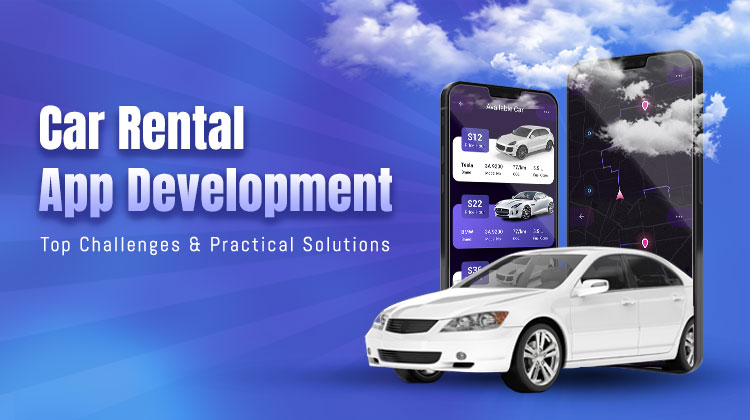
04 Apr, 2025
The way we move around is changing fast. People want more flexible, affordable, and digital options when it comes to transportation. That’s why car rental app development has become one of the most in-demand services in the travel and mobility industry.
By 2027, the global car rental market is expected to hit $104 billion, and most of this growth is being driven by digital platforms. Whether users are booking a quick ride in their city or renting a vehicle for a cross-country trip, they expect convenience, safety, and control at their fingertips.
However, building a smooth, scalable, and feature-rich car rental app is no easy task. Businesses must tackle a wide range of technical and operational challenges. This guide breaks down the most common problems in car rental application development and offers practical solutions that developers and businesses can apply.
If you’re planning to launch an app or upgrade your platform, these insights will help you avoid costly mistakes and build an app your users will love.
Challenge 1: Real-Time Tracking and Fleet Management
Customers want to see available cars, their exact locations, and estimated pickup times—instantly.
Solution:
• Use GPS and IoT-based systems for real-time tracking.
• Integrate cloud platforms like Geotab or Fleet Complete to manage the fleet from a central dashboard.
• Use geofencing to create zones and monitor vehicle movements.
This is essential for any on-demand car rental app development project, especially when managing multiple vehicles across cities.
Challenge 2: Dynamic Pricing and Transparent Costs
Unclear pricing often leads to user drop-offs. People want to know what they’re paying for, without surprises.
Solution:
• Use AI-driven pricing engines that adjust based on demand, location, and time.
• Clearly display a cost breakdown, including base fare, fuel, insurance, and any additional fees.
• Add a “compare price” tool at checkout to build trust.
This makes your car rental development services stand out by improving conversion and retention rates.
Challenge 3: Smooth KYC and Secure Verification
Verifying users is necessary, but long processes can frustrate customers and cause drop-offs.
Solution:
• Use instant eKYC tools like Jumio or HyperVerge with document scanning and facial recognition.
• Automate background checks linked to regional transport databases.
• Store encrypted identity data to streamline repeat bookings.
Secure and fast verification should be a priority in any car rental app development company’s checklist.
Challenge 4: Vehicle Condition Reports and Insurance
Disputes about scratches or damages can be a headache for both users and rental companies.
Solution:
• Let users upload timestamped photos or short videos before and after rentals.
• Use AI image recognition to detect dents or scratches.
• Sync with insurance partners to auto-generate claims through the app.
This builds accountability and reduces fraudulent claims—key in a quality car rental application development.
Challenge 5: Fast, Flexible Payments and Refunds
Inconsistent payment systems can slow down the entire rental experience.
Solution:
• Support multiple payment gateways (PayPal, Stripe, Razorpay) for flexibility.
• Enable one-click repeat payments with tokenization.
• Add auto-refund logic for canceled bookings and credits for loyal users.
When done right, this can turn occasional renters into loyal customers.
Challenge 6: Expansion Across Locations and Languages
Scaling to new regions brings language barriers, legal complexities, and operational friction.
Solution:
• Use internationalization (i18n) frameworks for multi-language support.
• Auto-apply local tax and legal settings based on the user’s location.
• Add region-specific rental terms and privacy policies for compliance.
A good car rental app development company always builds apps that can scale globally.
Challenge 7: Reliable Customer Support
Bad support experiences can lead to app uninstalls and poor ratings.
Solution:
• Add AI-powered chatbots to handle FAQs, status checks, and refund queries.
• Escalate complex issues to local service agents.
• Include emergency buttons and real-time location sharing during active rentals.
This ensures your users feel heard and supported at every step.
Challenge 8: Avoiding Booking Conflicts
Double bookings or delays hurt your brand and frustrate users.
Solution:
• Use AI-based scheduling logic to manage time gaps for cleaning and refueling.
• Automatically block unavailable cars from search results.
• Notify users with live alerts if there’s any change in booking status.
It’s a must-have for smooth on-demand car rental app development.
Challenge 9: App Speed and Performance
When demand spikes, especially during holidays or sales, your app must keep up.
Solution:
• Use cloud platforms like AWS or Google Cloud with auto-scaling infrastructure.
• Implement content delivery networks (CDNs) for faster loading across regions.
• Cache common queries like “cars near me” to reduce server load.
Stable performance is the backbone of any high-quality car rental development service.
Challenge 10: Data Privacy and Security
Car rental apps handle sensitive user data—payments, licenses, locations. That makes them prime targets for breaches.
Solution:
• Use strong encryption (AES-256) and secure HTTPS connections.
• Request clear, step-by-step user permissions.
• Run regular security checks and stay compliant with GDPR, CCPA, or local data laws.
Security builds trust. Trust drives retention.
Bonus Features That Make Your App Stand Out
Want to go a step further? These extras can enhance user experience:
• Gamify loyalty programs with badges or free rides.
• Let users filter listings by car type (EVs, SUVs, pet-friendly).
• Offer local deals or real-time surge alerts.
• Add a dashboard for individual car owners to rent out their vehicles (think Airbnb for cars).
These features are great for businesses that want to build a flexible, community-driven rental platform.
Final Thoughts
Car rental app development is more than writing code. It’s about understanding user behavior, regional laws, pricing models, and real-time logistics. Whether it’s dynamic pricing, fleet tracking, or data protection, every feature needs to be well-planned and precisely executed.
That’s why working with a skilled car rental app development company in Kolkata matters. At Idiosys Tech, we offer full-cycle car rental development services that help you launch or scale your business with confidence. From design to deployment, we build apps that are fast, flexible, and future-ready.
If you’re looking for a trusted partner in car rental application development, we’re here to help you hit the road with the right tech.
——————————————————————————————————
What features should a car rental app have?
Key features include real-time vehicle tracking, dynamic pricing, user registration & KYC, vehicle catalog, in-app payments, booking calendar, reviews, and customer support.
How can I prevent double bookings in my app?
Use intelligent scheduling algorithms and booking conflict detection to avoid overlaps. Add buffer time between bookings for cleaning or servicing.
Is it possible to build a multilingual and multi-currency car rental app?
Absolutely. A well-architected app can support multiple languages and currencies to operate globally or in different regions
How can I manage real-time vehicle tracking in the app?
Integrate GPS and telematics APIs to offer real-time tracking, geofencing, and route optimization within your platform
——————————————————————————————————
You May Also Read
An ultimate guide for on-demand Cab & Bike booking application

